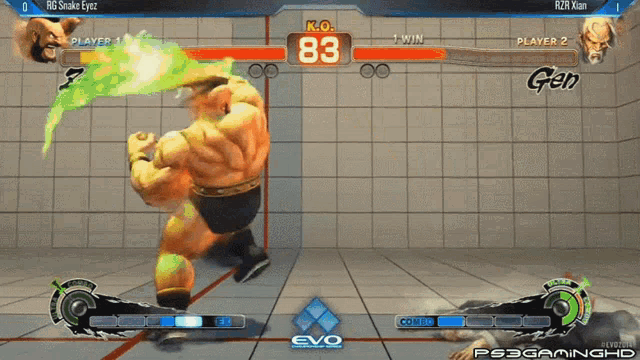Chapter 6: Critical Breakdown

In the continuing tradition of abstractions too painful for tiny brains, here’s a bit on how to avoid “giving it away”- the famous superpower of scrubs everywhere. Still having trouble avoiding ye olde psychic DP? Smell the shape of the match and keep your eyes open for the “critical points”.
These are points that occur during the course of a match where theres an opportunity for a significant shift in momentum/advantage. This can be just the chance to do a lot of damage (successfully crossing someone up, Zangief getting in position to land a super, etc.), but something doesnt have to be disastrous *in itself* to be a legitimately critical point. Sometimes relatively minor hits can lead into a nasty follow-up (losing momentum, and then getting trapped, for instance). Creating these critical points has a lot to do with the specifics of particular character matchups. Sometimes youre fighting for a particular position, sometimes youre waiting to build enough meter for a particular tactic, etc. Those are very particular, and change a lot depending on game, characters, and so on. Because of this, its pretty difficult to talk about them in general- so I wont try. What I’ll do instead is to discuss a few (slightly more generalizable) ways of avoiding and diffusing critical points instead, which is just as important in its own way.
The most important insight to have about critical points is that theyre good for the underdog. That means that if youre in the lead, you want to AVOID them. Similarly, if youve got a character advantage in your match (your character has a “natural” advantage over theirs)- avoid them. Even if youve only got a very small lead, if time is running out- avoid them.
Average players often make the mistake of equating the highest levels of play with constant offense. While its true that many of the best are virtually always doing something, and that something often involves sticking out a lot of moves (re: “attacking”), what theyre also doing (if theyre winning, or just have an advantage) is preventing critical points from arising. So theyre attacking, yes, but not attacking in a way that opens them up to any serious dangers (even if theyre not giving themselves opportunities to do a ton of damage, either). You can see a very simple example of this in some of the Chen v Valle fights. Valles Kim seems to be constantly attacking- and he is sticking a lot of stuff out- but very rarely is he doing much of anything that opens himself up to any serious counterattack. Sure, he might get poked here or there, but given Kims natural advantages over Chens R1s, its a really good idea just keep your distance, and play it safe. If you can force them to play your game (footsie, essentially), he’s going to be winning trades on damage, and landing more hits overall with his faster, longer range moves.
Heres another very common (and deadly) mistake: Even if theyre succeeding at not allowing the opponent to create a critical point, a lot of players will needlessly create critical points FOR their opponents. For instance, challenging a wakeup with a meaty attack when youre enjoying a substantial lead, or if youre a character thats most effective at a distance, can be a serious mistake. You may figure “Hey- if my meaty combo/crossup hits, I do 50% damage. If I get reversed, I only eat 15% damage. Sounds like a good bet.” Whats missing from the equation is the realization that you may be giving up a critical point- taking a risk you dont need to take. Youre giving the opponent a chance to reverse the flow of the match that he hasnt earned. Sure, you might really put him away with a particularly vicious combo, but is it worth risking a wake-up that reverses momentum and gives your opponent their first real (and unearned) shot at mounting a comeback? Just to make it clear Im not encouraging simple turtling, I should note that the answer to this question is often “yes”. Challenging wake-ups is part of applying consistent pressure, and pressure creates opportunities. But maintaining momentum doesnt simply mean attacking all-out at every opportunity. Dont give your opponent a chance he hasnt forced out of you.
In the Chen v Valle fights I mentioned, youll notice Alex passes up a lot of chances for fancy follow-ups to the many low RH knockdowns. And why? Not because he sucks- quite the opposite. It’s because hes not giving anything away. Alex has mastered attacking without seriously endangering himself wherever possible. On the other side of the coin, youve got Ricky Ortiz vs the badly outmatched Team Japan MVC2 players. In his single loss, Rickys was down to his Cyclops vs Ichigo’s Doom, with a big life advantage and time running out. A virtually assured win. Ricky snatched defeat from the jaws of victory by trying to showboat and go for some wacky setups instead of sticking to his ridiculously successful gameplan, and just running away for the rest of the match. For his trouble, he gets comboed and loses. Dont give up critical points if you dont have to.
As a little aside, this is why I tend to be more interested in tactics generally than in combos alone. Combos never CREATE an opportunity, theyre merely ways of taking advantage of existing opportunities. A prime example is again the Japanese MVC2 players- in the few chances they got to land a combo, they put on a real exhibition. However, in 25 matches, I can count the number of such opportunities on one hand. Combos are only any good when youve already broken down an opponents defense- and against good players, that dont come easy. As such, the threat that goes with combo skills can be entirely neutralized simply by keeping yourself out of position to get hit with them in the first place. This makes things like positioning, setups, tricks, etc, primary in a way that combos (while still important) can never be.
Okay, so youre trying to prevent critical points, and not giving any away, but one gets forced by the strong play of your opponent anyway. What to do? Diffuse it. One of the best ways is extremely simple: always keep your cool, and wait if possible. An example will help:
Ryu fights for the position that allows him to do a whiffing short hurricane, closing the distance with Dhalsim. Dhalsim has no fast, reliable counter for this approach- he usually has to wait until Ryu has recovered and then try and push him back out. This creates a potential critical point. Since Ryu knows that Dhalsim wants to push him back out, but will have to wait until the HK is over, hes really looking for an outstretched limb to meet him as hes landing. That limb is psychic DP bait.
There are two ways this can go. Dhalsims limb gets DPd, which not only puts him in really bad position (since Ryu has hurt him, knocked him down, and is right on top of him), but also scares him into thinking Ryu is reading his mind, etc (the standard ill effects of getting hit by a Psychic DP). Or, Dhalsim can resist the urge to stick out a limb immediately as Ryu lands, and instead wait a fraction of a second. Keeping your cool as Dhalsim has the following effects: 1) You get to punish Ryu if he was playing on autopilot, and had decided to DP on landing ahead of time, regardless of what you were doing (this is not as uncommon as it might sound). 2) If hes a better player than that, and was just going to use the enhanced reactions that accompany having predicted your moves, he wont DP since you didnt stick out your limb. The flag that would go up if he had successfully predicted your action (“here comes the limb, fire away!”) never comes up. So his expectations get reset, and the instant “psychic” character of his responses disappears. If Dhalsim keeps his cool for just a fraction of a second, he can effectively diffuse this essentially fake threat. After landing from the HK, Ryu isnt truly threatening- hes just in a much better position. To threaten with the throw, hell usually have to take at least one step forward first. But by waiting that fraction of a second and not trying to react at the earliest possible time, and THEN sticking out your pushaway limb, you can avoid the throw and dramatically reduce your chances of getting DPd. Youve diffused the situation and accomplished your objective without giving anything else away. All of this results from correctly assessing the real nature of the threat, then keeping your cool, and not freaking out just because Ryu is in your face, and youd prefer he were far away.
Just waiting this tiny fraction of a second can be a big part of diffusing critical points. This is because reacting at the earliest possible time (as soon as you come out of blockstun, for instance) makes you predictable in a certain sense. If you wait a moment beyond that most obvious point, the move you wanted to do again becomes very difficult to predict. If theres a continuum of possible times at which to do a move, predicting when it will come within that continuum is extremely difficult, unless you make it easy for them, by doing as soon as you possibly can (at time 0, essentially). Waiting can also help to diffuse (or mask, rather) critical points that you need to intentionally create, while on the offensive. If you’re going to try a meaty attack, special throw, etc, after someone is, say, getting up from a knockdown, your attack becomes FAR less effective if you make your intentions clear right away. If for instance, you hunker down immediately next to their fallen body as soon as they’re knocked down- for all practical purposes you’re telling them what your intentions are (by getting into a spot you can’t easily leave, without throwing your advantage away entirely). However, you could have the same attack plan (go for a meaty attack as they get up), but this time just stutter-step a bit- maybe jump randomly (if you’re character’s fast enough to do it), and stick out a few jabs. You can see a related, more obvious version of this problem in scrubby ST Ryu players. When you finally charge up a super in ST (back when it was actually a big deal to have a super), scrubs get so excited about having it that their whole gameplan shifts to focus on firing it off. Where before they might have been playing a controlled, fluid game, they become drooling morons when the meter fills up. Its so common that it actually has a name- “superitis”. The super really is a useful weapon and genuine threat, but not if youre going to fire it off at the earliest possible moment, and the opponent knows it. The value of this waiting is obvious when you notice how always doing things ASAP renders you predictable. Dancing around or just waiting a fraction of a second may sound like idiocy, but if it’s enough to inject a moment’s hesitation into your opponent’s response (and it is), then it really pays off. And what have you risked in doing it while they’re down? Nothing at all.
